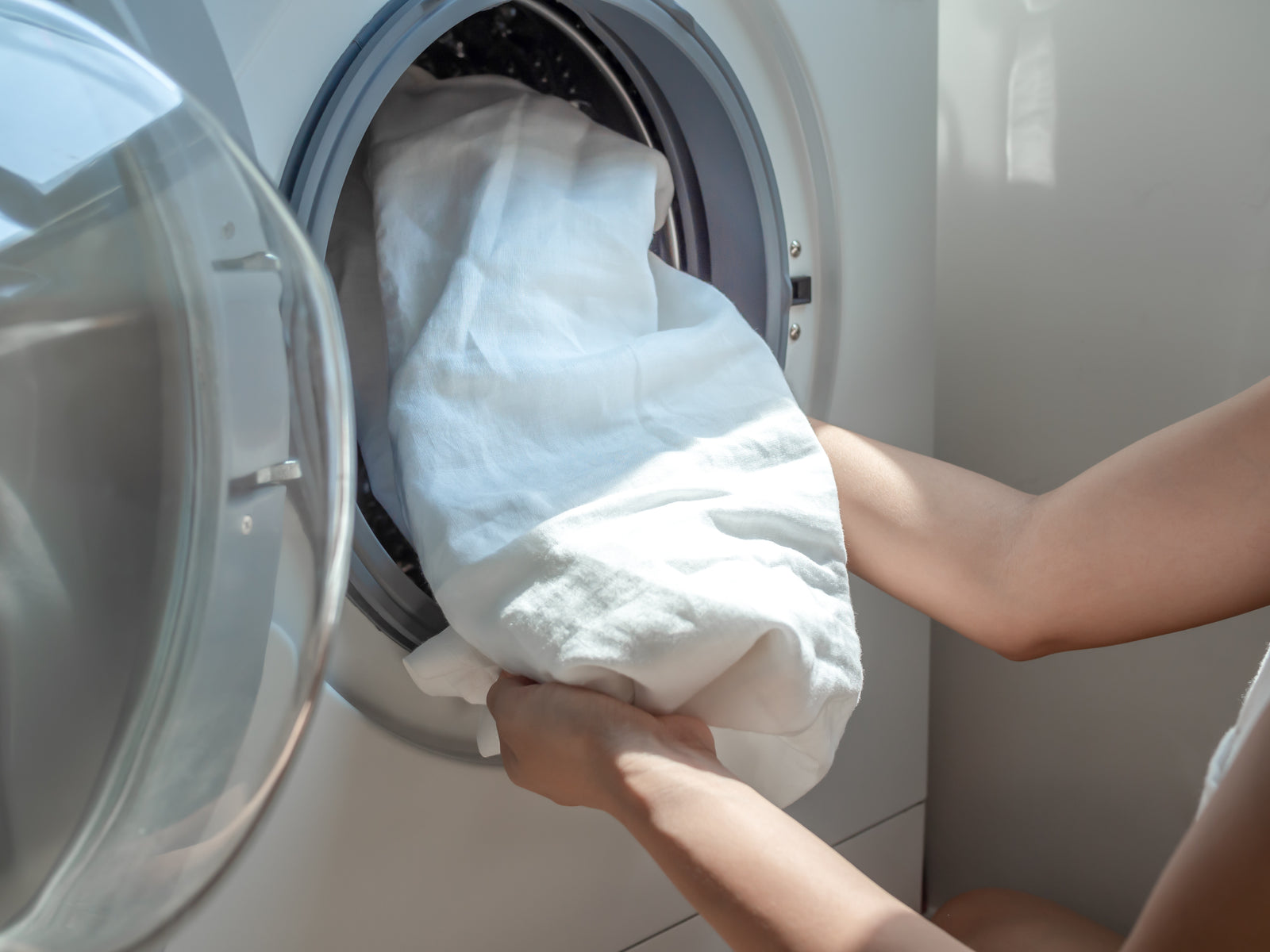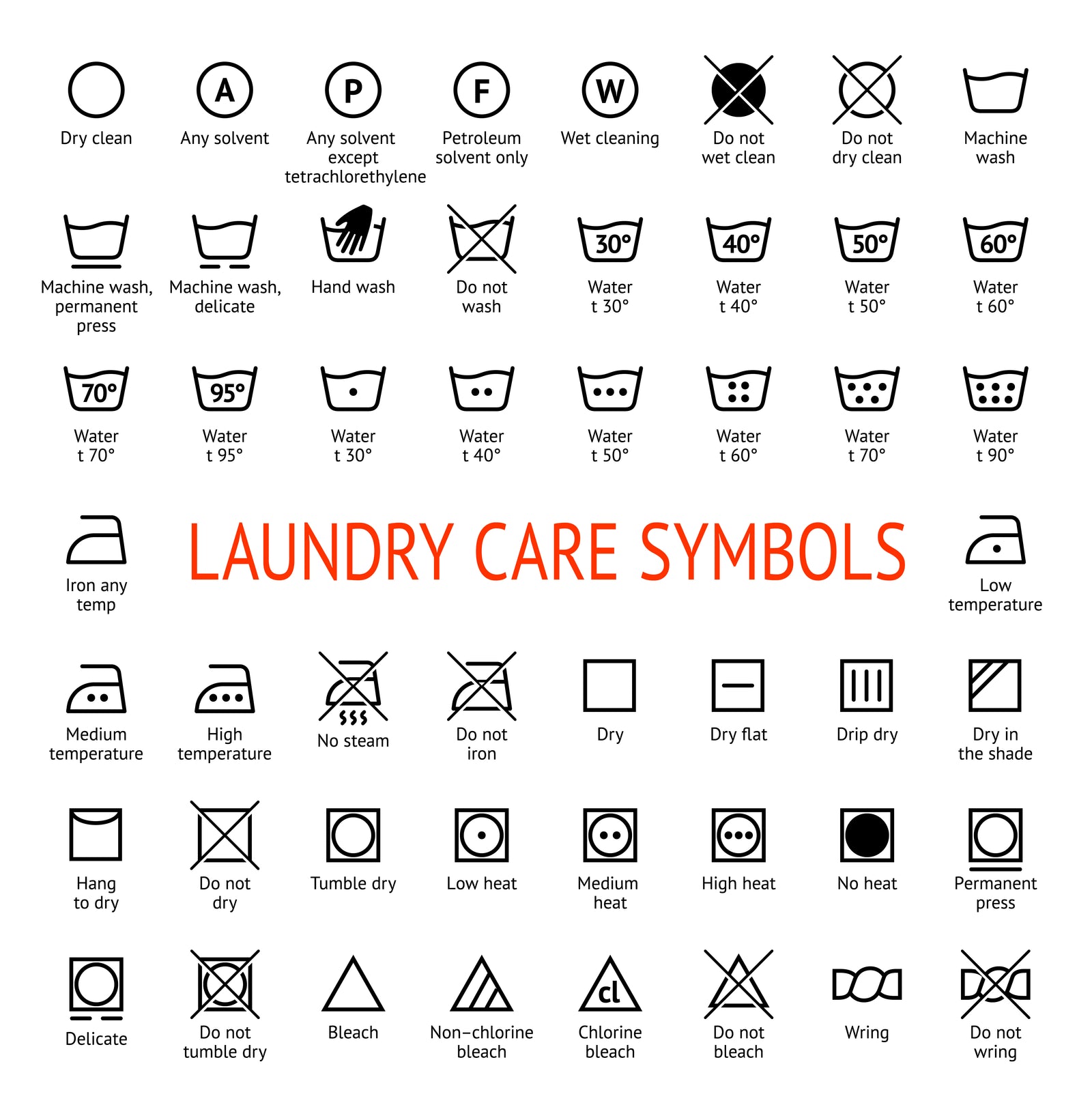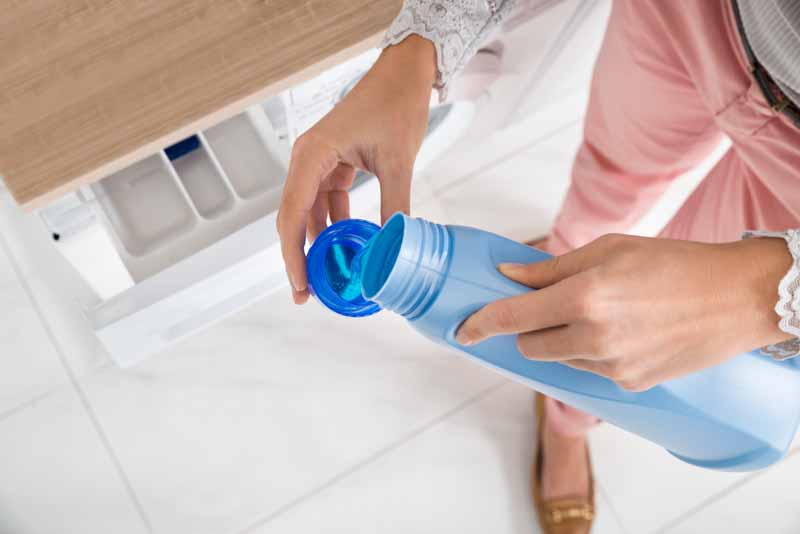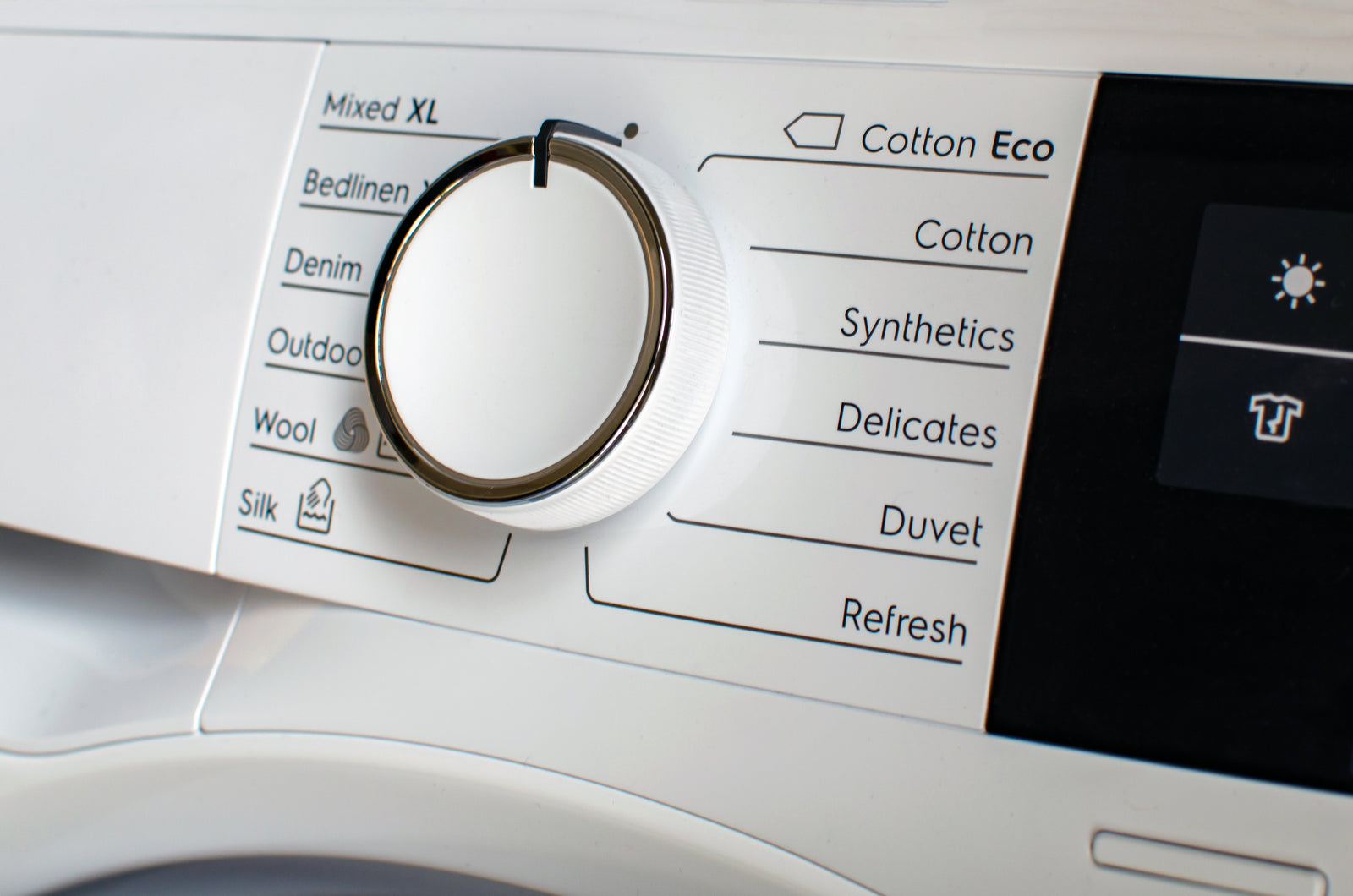So, you’ve bought yourself some high-quality cotton sheets and you want to keep them clean, fresh and smelling nice. What do you do? We suggest an eco-friendly approach for your home linens. Between using a mild liquid detergent, not overfilling the washer or dryer and drying on the lowest setting you will be able to maintain the cleanliness you are looking for. Here is a complete guide on how to wash your 100% cotton bed sheets to get a crisp wrinkle free result and a calm good night’s sleep.
So, you’ve bought yourself some high-quality cotton sheets and you want to keep them clean, fresh and smelling nice. What do you do? We suggest an eco-friendly approach for your home linens. Between using a mild liquid detergent, not overfilling the washer or dryer and drying on the lowest setting you will be able to maintain the cleanliness you are looking for. Here is a complete guide on how to wash your 100% cotton bed sheets to get a crisp wrinkle free result and a calm good night’s sleep.
Yes, you should wash your new sheets before using them. People should pre-wash their bedsheets before using. Use one cup of baking soda in the wash cycle and one cup of vinegar in the rinse cycle. Try to use a gentler cycle in cool water, not hot temperatures or hot washes. This step will remove any impurities in your sheets and help make them softer.
You should wash your sheets regularly, about once a week, so your sheets stay fresh and to take care of dust mites, dead skin cells and mold which can cause allergies. You should wash your sheets more frequently if you have sensitive skin, allergies, you are sick, spending a long time in bed, or if you sweat a lot during sleep. Some consumers choose to purchase two sets of sheets so they can rotate between the two making it easier on laundry day. We offer 20% off your second set of sheets when you buy two sets. If you would like to reduce how often you do regular washes, you can bathe before bed, keep pets from sleeping in the bed with you and not eat or drink in your bed.
Yes, you should wash your new sheets before using them. People should pre-wash their bedsheets before using. Use one cup of baking soda in the wash cycle and one cup of vinegar in the rinse cycle. Try to use a gentler cycle in cool water, not hot temperatures or hot washes. This step will remove any impurities in your sheets and help make them softer.
You should wash your sheets regularly, about once a week, so your sheets stay fresh and to take care of dust mites, dead skin cells and mold which can cause allergies. You should wash your sheets more frequently if you have sensitive skin, allergies, you are sick, spending a long time in bed, or if you sweat a lot during sleep. Some consumers choose to purchase two sets of sheets so they can rotate between the two making it easier on laundry day. We offer 20% off your second set of sheets when you buy two sets. If you would like to reduce how often you do regular washes, you can bathe before bed, keep pets from sleeping in the bed with you and not eat or drink in your bed.
If you see small stains on your bed sheets right away you should spot treat by applying some mild enzyme-based detergent and gently rubbing the spot with a cloth.
Removing the sheets as soon as the regular washing machine completes its wash cycle and then shaking out the bed sheets before placing them in the dryer can reduce wrinkles. If possible, fill your dryer only halfway to prevent twisted bedding and to allow the fabric to fluff. You can try taking the bedding out of the dryer a few minutes before the cycle ends when they are still a bit damp and make your bed immediately and smooth away the wrinkles. You can also try to spritz a small amount of water using a spray bottle, while the sheets are on the bed, and smooth out the wrinkles; as the fabric dries the wrinkles will naturally ease.
Learn more tips about how to get wrinkles out of cotton sheets
You should always wash your bed linens separate from clothes and towels. Clothes and towels have different properties which could damage your sheets while in the washer. Towels and clothing also have different drying instructions and do not dry as quickly as bed sheets
It’s better to wash smaller loads when washing your sheets, this ensures that they are washed properly and allows the detergent to do its work in a normal cycle.
If your cotton sheets are white, you will want to take proper care to wash those separately from colored sheets, this will keep the colors from bleeding onto the white sheets which will make the white sheets become dingy and grey (or blue or red).
If you see small stains on your bed sheets right away you should spot treat by applying some mild enzyme-based detergent and gently rubbing the spot with a cloth.
Removing the sheets as soon as the regular washing machine completes its wash cycle and then shaking out the bed sheets before placing them in the dryer can reduce wrinkles. If possible, fill your dryer only halfway to prevent twisted bedding and to allow the fabric to fluff. You can try taking the bedding out of the dryer a few minutes before the cycle ends when they are still a bit damp and make your bed immediately and smooth away the wrinkles. You can also try to spritz a small amount of water using a spray bottle, while the sheets are on the bed, and smooth out the wrinkles; as the fabric dries the wrinkles will naturally ease.
Learn more tips about how to get wrinkles out of cotton sheets
You should always wash your bed linens separate from clothes and towels. Clothes and towels have different properties which could damage your sheets while in the washer. Towels and clothing also have different drying instructions and do not dry as quickly as bed sheets
It’s better to wash smaller loads when washing your sheets, this ensures that they are washed properly and allows the detergent to do its work in a normal cycle.
If your cotton sheets are white, you will want to take proper care to wash those separately from colored sheets, this will keep the colors from bleeding onto the white sheets which will make the white sheets become dingy and grey (or blue or red).
You should be sure to read all of the washing instructions before washing your bed sheets, the washing instructions are found on the care label. Cotton sheets have special washing temperatures and instructions, so do other fabric types like polyester, polyester blends, flannel, bamboo and linen sheets.
You should be sure to read all of the washing instructions before washing your bed sheets, the washing instructions are found on the care label. Cotton sheets have special washing temperatures and instructions, so do other fabric types like polyester, polyester blends, flannel, bamboo and linen sheets.
You will want to pre-treat stubborn stains before washing. The best way to remove general stains is to soak the stain in an enzyme-based mild and gentle detergent for 10-15 minutes. You can also mix some baking soda with water to create a thick paste; wet the stain with some water then apply the paste directly to the stain. A pre-wash stain remover will work as well.
When you load your washing machine, you should be sure to wash the sheets separately from other items. Washing your sheets with towels and other items can cause pilling and excess lint on your sheets. If you have an agitator in your washing machine, you will want to evenly distribute the sheets around the agitator by loosely crumpling up each sheet into a ball and placing them around the agitator. If you do not have an agitator, just place them around the outside of the tub as if there were an agitator. There should be a hole in the middle of the bedding where the agitator would be. You should only wash one set of sheets at a time. Overfilling your washer could result in sheets not getting washed thoroughly or the sheets getting bunched up and tangled which could damage your sheets and/or washer.
You should use special care when selecting the correct cycle when washing sheets. Some new machines have a setting for sheets. If yours does then you should use that setting. If your washing machine does not have this special setting, choosing a normal cycle or gentle cycle will be appropriate.
You should always wash your bed sheets in cold water, not warm water, lukewarm water or hot water. Consumer Reports past tests found detergents have gotten much better at putting enzymes to work in removing dirt, stains and body oils at lower water temperatures, and are less effective at higher temperatures. Click here to read more about it. If you choose to wash your sheets in the hottest water temperature setting, it could harm the fibers as well as increase shrinkage and if you have colored sheets it will escalate fading.
You will want to pre-treat stubborn stains before washing. The best way to remove general stains is to soak the stain in an enzyme-based mild and gentle detergent for 10-15 minutes. You can also mix some baking soda with water to create a thick paste; wet the stain with some water then apply the paste directly to the stain. A pre-wash stain remover will work as well.
When you load your washing machine, you should be sure to wash the sheets separately from other items. Washing your sheets with towels and other items can cause pilling and excess lint on your sheets. If you have an agitator in your washing machine, you will want to evenly distribute the sheets around the agitator by loosely crumpling up each sheet into a ball and placing them around the agitator. If you do not have an agitator, just place them around the outside of the tub as if there were an agitator. There should be a hole in the middle of the bedding where the agitator would be. You should only wash one set of sheets at a time. Overfilling your washer could result in sheets not getting washed thoroughly or the sheets getting bunched up and tangled which could damage your sheets and/or washer.
You should use special care when selecting the correct cycle when washing sheets. Some new machines have a setting for sheets. If yours does then you should use that setting. If your washing machine does not have this special setting, choosing a normal cycle or gentle cycle will be appropriate.
You should always wash your bed sheets in cold water, not warm water, lukewarm water or hot water. Consumer Reports past tests found detergents have gotten much better at putting enzymes to work in removing dirt, stains and body oils at lower water temperatures, and are less effective at higher temperatures. Click here to read more about it. If you choose to wash your sheets in the hottest water temperature setting, it could harm the fibers as well as increase shrinkage and if you have colored sheets it will escalate fading.
We suggest using a mild enzyme-based detergent for cotton to wash your bed sheets. Some enzyme-based mild detergents are Seventh Generation, Biokleen, Ecos, Woolite, Arm & Hammer, Tide, Gain, Purex, All and Wisk. Be careful not to use too much detergent on your sheets as this leaves a coating and you will not have fresh sheets. You should add just the right amount or a little less to the load. Never pour your detergent directly onto the sheets; allow your washing machine to fill up then pour in the detergent into the full tub, or use your washing machines dispenser.
We do not recommend using bleach as it deteriorates the cotton fibers and cotton is a delicate fabric. If you do choose to use bleach, we suggest an oxygen-based bleach like OxiClean™ or Clorox 2® which do not leave harsh chemicals in the fabric. An oxygen-based bleach will lighten our natural and latte linen bed sheets, so we do not recommend it on those colors.
Alternatively, you can add a half cup of natural whiteners such as baking soda, borax or white vinegar to the rinse cycle to help whiten your sheets. You can also occasionally soak your bed sheets in a tub with a mixture of borax, washing soda and laundry detergent to help them stay white. Additionally, a quarter cup of lemon juice in the wash cycle will help brighten your sheets.
Fabric softener is a personal choice. While it does help soften the material it also loosens the material which makes the sheets less crisp. If you choose to use fabric softener, we would suggest an environmentally friendly one. Here is a link on how to make your own fabric softener with everyday ingredients. Do not use too much fabric softener as this can coat the fabric and will not allow the dirt and grim to be washed off and will make them less breathable. Another option is to use a half cup of vinegar to the rinse cycle to help soften your bedding
We suggest using a mild enzyme-based detergent for cotton to wash your bed sheets. Some enzyme-based mild detergents are Seventh Generation, Biokleen, Ecos, Woolite, Arm & Hammer, Tide, Gain, Purex, All and Wisk. Be careful not to use too much detergent on your sheets as this leaves a coating and you will not have fresh sheets. You should add just the right amount or a little less to the load. Never pour your detergent directly onto the sheets; allow your washing machine to fill up then pour in the detergent into the full tub, or use your washing machines dispenser.
We do not recommend using bleach as it deteriorates the cotton fibers and cotton is a delicate fabric. If you do choose to use bleach, we suggest an oxygen-based bleach like OxiClean™ or Clorox 2® which do not leave harsh chemicals in the fabric. An oxygen-based bleach will lighten our natural and latte linen bed sheets, so we do not recommend it on those colors.
Alternatively, you can add a half cup of natural whiteners such as baking soda, borax or white vinegar to the rinse cycle to help whiten your sheets. You can also occasionally soak your bed sheets in a tub with a mixture of borax, washing soda and laundry detergent to help them stay white. Additionally, a quarter cup of lemon juice in the wash cycle will help brighten your sheets.
Fabric softener is a personal choice. While it does help soften the material it also loosens the material which makes the sheets less crisp. If you choose to use fabric softener, we would suggest an environmentally friendly one. Here is a link on how to make your own fabric softener with everyday ingredients. Do not use too much fabric softener as this can coat the fabric and will not allow the dirt and grim to be washed off and will make them less breathable. Another option is to use a half cup of vinegar to the rinse cycle to help soften your bedding
Line drying your cotton sheets is the best option. You can dry sheets in direct sunlight on a line outside, or if it’s too cold outside, use an indoor drying rack. If you choose to use a dryer, you should set your dryer setting to the lowest heat possible. Using the lowest setting will keep the cotton fibers from getting damaged. If you choose to use a hot cycle or an extra-long setting, it will damage the fibers of the sheets and cause extra shrinkage. You can use the Automatic setting if you dryer has one and your dryer will turn off when the dryer senses the sheets are dry.
Using a dryer sheet is a personal choice, just like fabric softener. The dryer sheets do coat the fabric making them less breathable. Alternatively, you can use Wool Dryer Balls. Wool dryer balls are an easy solution to soften your sheets. All of the bouncing around they do makes the sheets feel softer when they are dried. Additionally, your sheets will dry faster with them, since they allow the air to circulate in the dryer.
Line drying your cotton sheets is the best option. You can dry sheets in direct sunlight on a line outside, or if it’s too cold outside, use an indoor drying rack. If you choose to use a dryer, you should set your dryer setting to the lowest heat possible. Using the lowest setting will keep the cotton fibers from getting damaged. If you choose to use a hot cycle or an extra-long setting, it will damage the fibers of the sheets and cause extra shrinkage. You can use the Automatic setting if you dryer has one and your dryer will turn off when the dryer senses the sheets are dry.
Using a dryer sheet is a personal choice, just like fabric softener. The dryer sheets do coat the fabric making them less breathable. Alternatively, you can use Wool Dryer Balls. Wool dryer balls are an easy solution to soften your sheets. All of the bouncing around they do makes the sheets feel softer when they are dried. Additionally, your sheets will dry faster with them, since they allow the air to circulate in the dryer.
By using this guide on how to wash cotton sheets, you can keep your sheets clean and ready to use. By choosing the proper wash routine and temperature and avoiding some common mistakes, like harsh detergents or the heavy-duty cycle you’ll be able to enjoy your luxury hotel quality sheets for many years.
By using this guide on how to wash cotton sheets, you can keep your sheets clean and ready to use. By choosing the proper wash routine and temperature and avoiding some common mistakes, like harsh detergents or the heavy-duty cycle you’ll be able to enjoy your luxury hotel quality sheets for many years.



